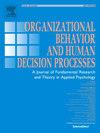A donation-based indicator of political ideology (DIPI): An open dataset for studying the political ideologies of employees, top management teams, CEOs, boards, and industries
IF 3.8
2区 管理学
Q2 MANAGEMENT
Organizational Behavior and Human Decision Processes
Pub Date : 2025-05-01
DOI:10.1016/j.obhdp.2025.104419
引用次数: 0
Abstract
Political ideologies are as salient in the workplace today as ever, and scholars have made considerable progress studying how such beliefs impact employees and organizations. But assessing the political views of those who work in organizations is a laborious task that can limit the ability of researchers to ask important questions that span firms and levels of analyses. To help address these challenges, scholars have demonstrated the effectiveness of assessing political ideology using an individual’s history of financial donations to partisan politicians and action committees. Despite the benefits of this measure, which we refer to as the “donation-based indicator of political ideology” (DIPI), its adoption has been limited due to the labor- and computationally-intensive nature of calculating it. Our study seeks to broaden access to DIPI by providing new open datasets that make political ideology scores widely available and easy to integrate for researchers studying workplace politics through many different theoretical lenses. The datasets we provide represent the culmination of combing through 107 million donation records to provide information about the political ideology of employees, top management teams, CEOs, and boards for 4,133 publicly owned firms that were featured in the S&P 1500 at any point between 1992 and 2022. We elaborate how these DIPI data can enable new and powerful scholarship on political ideology across organizational levels, partisanship within and between firms, political (in)congruence between firm actors, industry dynamics, temporal trends, and many other important questions.
Datasets located at: tiny.cc/politicalideology.
基于捐赠的政治意识形态指标(DIPI):一个开放的数据集,用于研究员工、高层管理团队、首席执行官、董事会和行业的政治意识形态
政治意识形态在今天的工作场所一如既往地突出,学者们在研究这些信念如何影响员工和组织方面取得了相当大的进展。但是,评估组织中工作人员的政治观点是一项费力的任务,可能会限制研究人员提出跨越公司和分析层次的重要问题的能力。为了帮助应对这些挑战,学者们已经证明了利用个人对党派政治家和行动委员会的财政捐款历史来评估政治意识形态的有效性。尽管这种我们称之为“基于捐赠的政治意识形态指标”(DIPI)的措施有好处,但由于计算它的劳动和计算密集型性质,它的采用受到限制。我们的研究旨在通过提供新的开放数据集来扩大对DIPI的访问,这些数据集使政治意识形态得分广泛可用,并且易于通过许多不同的理论镜头对研究工作场所政治的研究人员进行整合。我们提供的数据集代表了对1.07亿笔捐赠记录进行梳理的结果,以提供有关1992年至2022年期间标准普尔1500指数中4133家上市公司员工、高层管理团队、首席执行官和董事会的政治意识形态信息。我们详细阐述了这些DIPI数据如何能够在跨组织层面的政治意识形态、企业内部和企业之间的党派关系、企业参与者之间的政治一致性、行业动态、时间趋势和许多其他重要问题上提供新的强有力的学术研究。数据集位于:tiny.cc/政治意识形态。
本文章由计算机程序翻译,如有差异,请以英文原文为准。
求助全文
约1分钟内获得全文
求助全文
来源期刊
CiteScore
8.90
自引率
4.30%
发文量
68
期刊介绍:
Organizational Behavior and Human Decision Processes publishes fundamental research in organizational behavior, organizational psychology, and human cognition, judgment, and decision-making. The journal features articles that present original empirical research, theory development, meta-analysis, and methodological advancements relevant to the substantive domains served by the journal. Topics covered by the journal include perception, cognition, judgment, attitudes, emotion, well-being, motivation, choice, and performance. We are interested in articles that investigate these topics as they pertain to individuals, dyads, groups, and other social collectives. For each topic, we place a premium on articles that make fundamental and substantial contributions to understanding psychological processes relevant to human attitudes, cognitions, and behavior in organizations. In order to be considered for publication in OBHDP a manuscript has to include the following: 1.Demonstrate an interesting behavioral/psychological phenomenon 2.Make a significant theoretical and empirical contribution to the existing literature 3.Identify and test the underlying psychological mechanism for the newly discovered behavioral/psychological phenomenon 4.Have practical implications in organizational context

 求助内容:
求助内容: 应助结果提醒方式:
应助结果提醒方式:


